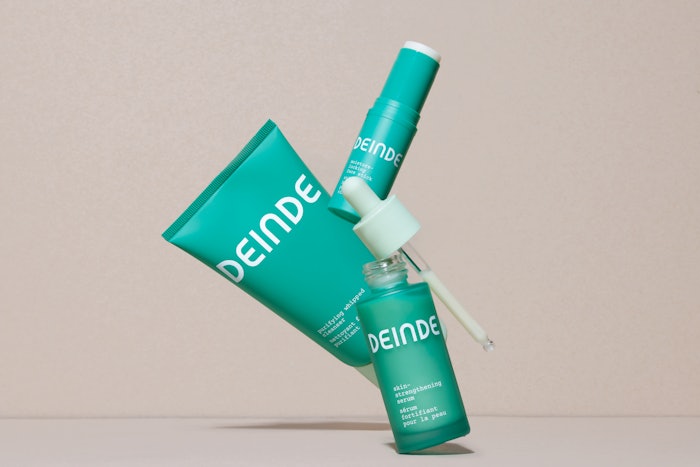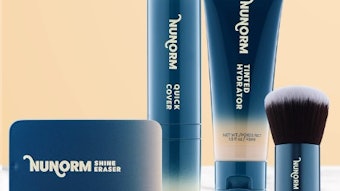
Debut, the biotech firm that has so far raised $70 million in capital from BOLD, L’Oreal’s venture capital fund, has launched Deinde (Latin for "next, then, thereafter"), a consumer skin care brand that targets inflammaging and boosts skin longevity.
Deinde leverages Debut's biotech-derived naringenin, a flavonone typically found in citrus. A study in the journal Foods, for instance, recently noted that "[N]aringenin and apigenin are prospective ingredients that contribute to the amelioration of skin damage by activating anti-inflammatory and antioxidative responses."
The SKUs also feature materials such as biotech squalane, ceramides NP (normal fatty acid/phytosphingosine base), upcycled date seed extract, niacinamide, biomimetic tripeptide, polysaccharides, biotech fermented vegetable-based glycols and allantoin.
 "It is rare in beauty innovation to come across groundbreaking new technologies, especially in the realm of ingredient actives—the core drivers of formulations’ performance and the tools we use to solve our consumers’ skin problems," says Dominique Gagnon, VP of consumer brands at Debut.Debut
"It is rare in beauty innovation to come across groundbreaking new technologies, especially in the realm of ingredient actives—the core drivers of formulations’ performance and the tools we use to solve our consumers’ skin problems," says Dominique Gagnon, VP of consumer brands at Debut.Debut
She adds, "We think what’s next in skin care will be a shift in the industry to focus on sustaining skin health and promoting the longevity of healthy skin, a different philosophy from anti-aging skin care."
Inflammaging's chronic, low-level inflammation reportedly speeds up the early signs of aging. In skin, inflammaging is associated with increased senescence, which can lead to "declining skin structure and function." In particular, Debut notes, inflammaging is associated with the breakdown of collagen and elastin.
(Interestingly, inflammaging is a whole-body challenge, which may also impact ailments such as dementia, arthritis and type 2 diabetes.)
"We were particularly captivated by the data that shows inflammaging is less a critical concern prior to the age of 25," says Gagnon. "With hormonal changes in becoming an adult, your rapid natural reparative processes in wound healing and regenerating skin start to decline at that age and inflammaging becomes more likely to contribute to skin damage and what we see as the visible signs of aging."
Deinde is Debut's first brand launch; the company describes itself as "a product-centric, fully vertically integrated biotechnology company that focuses on creating novel bioactive ingredients."
The company uses fermentation and cell-free biotech to scale up the manufacture of these bioactives, which are typically found in just trace amounts in the natural world, per Debut. These materials can reportedly be manufactured and incorporated into finished products in as little as six weeks.
According to a study in the journal Life, cell-free biotech offers "increased efficiency, versatility and low cost compared to in vivo systems." Furthermore, "[C]ell-free platforms are not hindered by constraints for supporting life and are therefore highly adaptable to a broad range of production and testing schemes."
Deinde's range comprises a Skin-Strengthening Serum ($88), Moisture Locking Face Stick ($36) and Purifying Whipped Cleanser ($32).
All comprise 93% or more biobased ingredients.
Q&A: Dominique Gagnon, VP of Consumer Brands at Debut, Talks Biotech & Brands
What is Debut's strategy for launching consumer brands from its biotech platform?
Gagnon: As a vertically integrated company, Debut uses synthetic biology and our proprietary advanced biomanufacturing processes to produce our novel biotech active ingredients at scale. With this approach, Debut is pioneering the beauty industry’s transition away from petroleum, cultivation (including chemicals that are used as part of cultivation), and animal use towards a safe and sustainable future, with a low carbon footprint.
Our advanced biomanufacturing platform combines all the elements, including ingredient discovery, clinical testing, formulation, manufacturing, and scaling in record time (under six weeks) in order to create high-performing, clinically-backed bio-based ingredients, and incorporate them in finished beauty products.
Over the past 12 months, Debut has screened over 7,000 plant compounds, and tested over 250 in our in-house screening platform to create a pipeline of novel, safe, and clinically-backed bioactive ingredients. The standards we set for ingredient selection are unique in the industry—we are not looking to swap ingredients or match benefits—every ingredient we bring to market outperforms existing actives significantly, changing the game for what topical products can achieve. With biotech, they also have reliable potency and purity unmatched in plant extracts batch to batch; they have pharma-like precision dosage with every application.
Brand incubators in the U.S. tend to create differentiation and brand strength from celebrity persona, creative visual storytelling, or tapping into ethnic heritage. It is rare in beauty innovation to come across groundbreaking new technologies, especially in the realm of ingredient actives—the core drivers of formulations’ performance and the tools we use to solve our consumers’ skin problems. It was a natural evolution to want to realize the full business potential of their value by creating in-house brands. We see it as both a core business and as a platform to educate the market, creating demand for novel high-performance biotech actives, to support our brands and our b2b and ingredient businesses.
Why is inflammaging such a key area of focus for the Deinde range?
Gagnon: We care and value solving for skin health—and the future of what skin care can be as a practice. The last 50-plus years of skin care has been focused on repairing damage already done—wrinkle creams, fillers, treatments, etc. We think what’s next in skin care will be a shift in the industry to focus on sustaining skin health and promoting the longevity of healthy skin, a different philosophy from anti-aging skin care.
It was important to us with our first brand to be at the forefront of preventing skin damage and longevity. We partnered with external scientists, including some studying the inflammasome, and were introduced to inflammaging and the body of research that has built over the last few decades which adds a missing puzzle piece to the conversation of rising environmental stressors, and how they trigger damage to the skin. '
We were particularly captivated by the data that shows inflammaging is less a critical concern prior to the age of 25; with hormonal changes in becoming an adult, your rapid natural reparative processes in wound healing and regenerating skin start to decline at that age and inflammaging becomes more likely to contribute to skin damage and what we see as the visible signs of aging.
We had seen inflammaging discussed in the holistic health space as it pertains to diet and overall health, but had yet seen a strong solution in market for skin. We screened our ingredient pipeline for a biotech active that would perform, and were amazed by naringenin’s out-performance in anti-inflammatory and anti-aging pathways, and when applied to stressed skin, spiking inflammaging markers, the skin returns almost to a pre-stressed, neutral state, an unusual level of high performance.
I foresee inflammaging management will soon be as commonplace in skin care as proper sunscreen protection, skin barrier management, or maintaining a healthy microbiome.
Is the brand expected to remain DTC or expand to retail partners?
Gagnon: We are focused on D2C and believe that is where you build community and connection to your consumer. We do envision retail being part of Deinde's growth and will want to ensure we work with the right retailers, those who will be partners in building our brand and behind our mission to educate on inflammaging and what biotech can bring to the industry.
Other biotech firms have launched brands to varying degrees of success; what is Debut doing differently to drive success for its incubated brands?
Debut’s business model sits at the intersection of some of the most advanced biomanufacturing approaches that exist today, in tandem with addressing consumers’ ever-evolving needs. We care about what consumers desire and need to live a better life, and we use biotechnology to create and support that. Instead of going after the same active ingredients that the beauty industry has always produced, such as vitamin C, squalane, retinol or niacinamide, we are accessing ingredients that consumers have never heard of before. These ingredients clinically outperform current ingredients available, and they are manufactured according to the highest sustainability standards. Debut delivers outstanding ingredients with high performance, safety and quality assurance—all led by our cutting-edge science.
Are more brand launches forthcoming? What consumer concerns might they target?
Gagnon: Just wait and see! Yes, with the wealth of our ingredient pipeline, and the entrepreneurial team at Debut, it is in our DNA to be working on our next innovation (or two).
We foresee a future in which Debut has a portfolio of brands, whether homegrown or not, across beauty categories, in which our biotech actives redefine what consumers expect from their average skin care, as well as reshape formulations to have significantly lighter carbon footprints.










